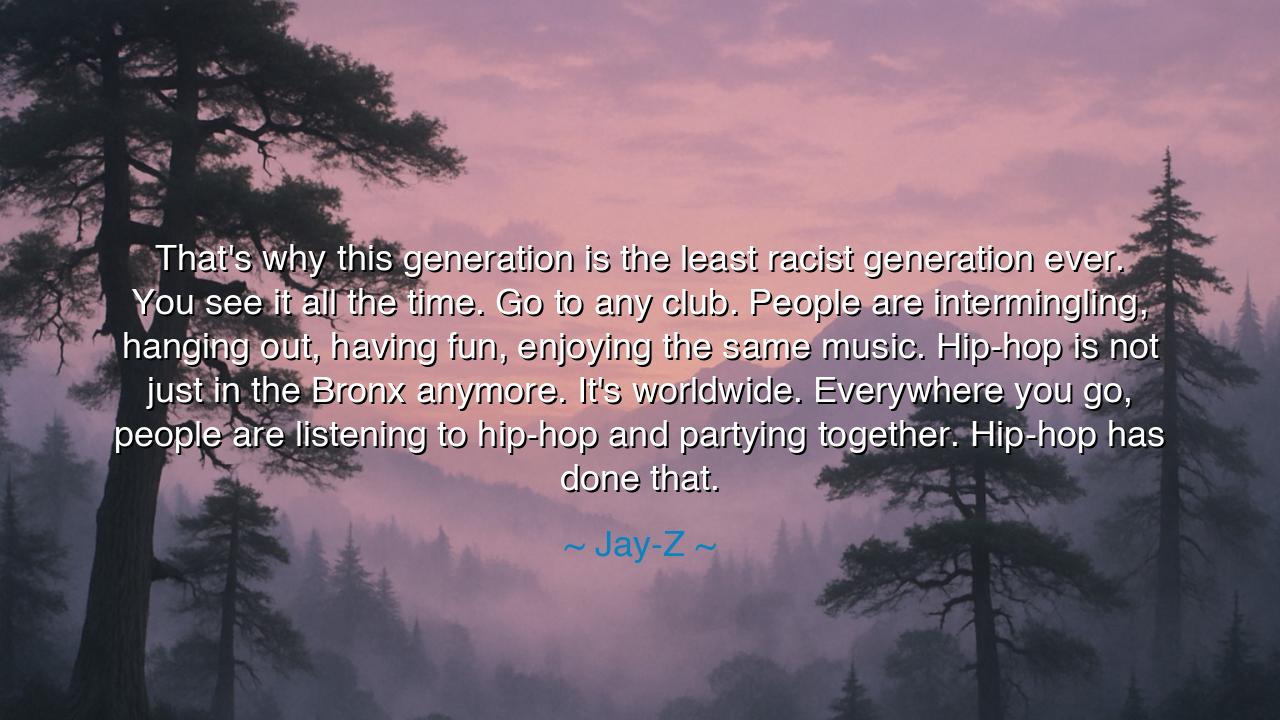
That's why this generation is the least racist generation ever.
That's why this generation is the least racist generation ever. You see it all the time. Go to any club. People are intermingling, hanging out, having fun, enjoying the same music. Hip-hop is not just in the Bronx anymore. It's worldwide. Everywhere you go, people are listening to hip-hop and partying together. Hip-hop has done that.






“That’s why this generation is the least racist generation ever. You see it all the time. Go to any club. People are intermingling, hanging out, having fun, enjoying the same music. Hip-hop is not just in the Bronx anymore. It’s worldwide. Everywhere you go, people are listening to hip-hop and partying together. Hip-hop has done that.” Thus spoke Jay-Z, one of the architects of a movement greater than music, a movement that rose from the pavements of the Bronx and spread across the globe like fire. In his words is both celebration and revelation: that hip-hop, born from struggle, has become not merely a sound but a unifying force, breaking down the ancient walls of division and giving birth to a generation more free of prejudice than those before it.
The origin of this wisdom lies in the birth of hip-hop itself. In the 1970s, amidst poverty, violence, and neglect, young men and women in the Bronx created something out of nothing. With turntables, rhymes, and breakbeats, they forged a culture that was at once art and resistance, expression and survival. What began as the voice of the marginalized soon grew to be the heartbeat of a global people. And as it spread, it carried with it not only rhythm but also community, drawing together races, nations, and generations under one shared banner of sound.
Consider the story of Nelson Mandela’s release from prison. When South Africa emerged from the shadow of apartheid, it was not only political speeches that bound the people—it was music. Hip-hop artists around the world spoke against injustice, linking the struggle of Harlem, Compton, and Soweto into one chorus. In this way, hip-hop became more than entertainment; it became a bridge of solidarity, a common language of resistance and joy. Mandela himself praised the power of music to unite, and hip-hop answered that call with force.
Jay-Z’s words also call us to witness the power of shared experience. In the club, at the concert, on the street corner, people of different colors, faiths, and nations gather beneath the same beat. The divisions that politics and prejudice enforce crumble in the face of rhythm. For when a song shakes the body, no man asks the color of his neighbor’s skin; when a chorus rises, no woman refuses to sing because of who stands beside her. This is the unspoken revolution of hip-hop: it has created a generation that instinctively sees more of what unites than what divides.
History shows us other moments when art shattered barriers. The Harlem Renaissance of the 1920s brought Black literature, jazz, and visual art into the mainstream, forcing America to confront both its creativity and its racism. Jazz was once condemned as “devil’s music,” yet soon it was embraced across racial lines, its rhythms dancing in the hearts of people worldwide. Hip-hop is heir to that tradition, but greater still—for in the digital age, it has spread to every continent, carrying with it the spirit of unity and progress.
The lesson for us is clear: art is not powerless. It is a weapon against ignorance, a balm for division, a seed of unity. If hip-hop—once dismissed as noise from the ghettos—can now gather people of every race under one rhythm, then it proves that human beings can find common ground through culture, through creativity, through shared joy. We must not underestimate this. Prejudice thrives in silence, but it withers in laughter, in dancing, in the shared chorus of a song.
Therefore, let each person act with intention. Support the arts that unify, the voices that uplift, the rhythms that bring together rather than divide. In your own life, do not close yourself off to the music of others—listen, dance, celebrate. For when you join with those who are different, you create a new community, one that racism cannot easily shatter. In doing so, you follow the path that hip-hop has already begun.
So let Jay-Z’s words endure as testimony: “Hip-hop is not just in the Bronx anymore. It’s worldwide. Everywhere you go, people are listening to hip-hop and partying together. Hip-hop has done that.” Let them remind us that music is not a luxury, but a power capable of reshaping generations. And if one generation can be the least racist because of it, then perhaps, through art and unity, a future may come when racism itself is but a forgotten echo.






AAdministratorAdministrator
Welcome, honored guests. Please leave a comment, we will respond soon